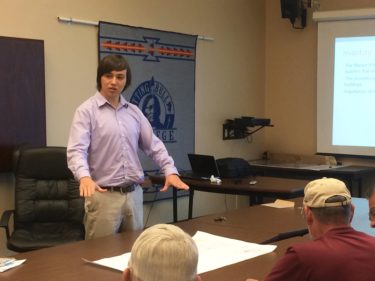The Positive Impacts of a Democratic Planning Process
Mathew Langley, Confederated Tribes of Grand Ronde

In the summer of 2016, Mathew Langley (MUP ’17) interned as a Junior Program Analyst for the Bureau of Indian Affairs Great Plains Region, Division of Facilities in Aberdeen, South Dakota. This was a transformative experience as he spent three months assessing data, relevant policies, and housing conditions to create a Comprehensive Plan that would outline a 20-year process to improve the existing conditions of the community. The internship focused on a pilot project to assess and address the housing stock and built environment at the agency location of Standing Rock at Fort Yates, North Dakota that served local employees. These locations are typically on reservations, which are often in remote locations and have a limited housing market. As an incentive, government agencies offer housing opportunities for their employees to compensate for the housing deficiency. The existing housing stock was built nearly 80 years ago and has severely deteriorated due to harsh natural conditions, and the presence of mold and radon in the dwellings. The environmental degradation, coupled with programmatic and budgetary issues led to poor, and in some cases hazardous, conditions over time for the residents. Through stakeholder engagement, Mathew quickly discovered that these poor housing conditions were detrimental to the economic vitality of the community. In some instances, BIA employees sought employment elsewhere to improve their living circumstances. He realized that by improving the built environment, this community would begin to enjoy a healthier quality of life both physically and socially.
Mathew sites the time he spent in the UW Master of Urban Planning (MUP) program as an important building block to gain the expertise that made this experience possible. The hard skills that he learned during his time in the MUP program were instrumental in developing a draft master plan for the Great Plains Regional Office (GRPO) in South Dakota. In creating the plan, Mathew utilized his skills in research design, visual communication, and comprehensive plan implementation to create a planning methodology that the Bureau of Indian Affairs (BIA) GPRO would later use as a blueprint for future documents.
The plan he drafted has since been adopted and the BIA GRPO is looking to replicate the process in all the local agencies in the region over time. “As the plans for one agency begin to undergo implementation, Facilities intends to work with another local agency to apply my process and begin drafting a new plan that identifies and evaluates the needs of that community.” In time, the intent is to stagger the development of each successive plan so that time and resources can be properly allocated to the appropriate communities. By involving local experts and key stakeholders in the planning process, his collaborative planning practice has led to long term improvements in the community. His work culminated in a thesis project titled A Roadmap to Better Agency Planning: A Case Study in the Bureau of Indian Affairs, Great Plains Regional Office Division of Facilities Pilot Project. This stands as a beaming example of applied planning theory centered on collaborative planning and illustrates the power of community engagement.
Where is he now?

Mathew Langley is a graduate from the University of Washington with a concurrent Master of Urban Planning (MUP) degree from the Department of Urban Design and Planning, and Master of Public Administration (MPA) degree from the Evans School of Public Policy and Governance. Mathew started working at the Jackson County Development Services Planning Department in Medford, Oregon as a professional planner in September 2017. His current planning practice involves understanding the Land Development Ordinances adopted by the county and helping individuals navigate the language of those ordinances throughout the application process. “Whether helping people coming in with questions or looking over applications, I’m immersed in serving the public in a way that protects resources and provides fair opportunity for land uses.” He also works in partnership with Jackson County’s Floodplain Manager on the implementation of the Community Rating System Program, which grants rankings and flood insurance discounts for communities who participate in the National Flood Insurance Program. Driven by his passion to provide knowledgeable and robust assistance to his community, Mathew is now practicing to become a Certified Floodplain Manager.
To read more testimonials from students in the Master of Urban Planning program, please visit Why I Chose UW.